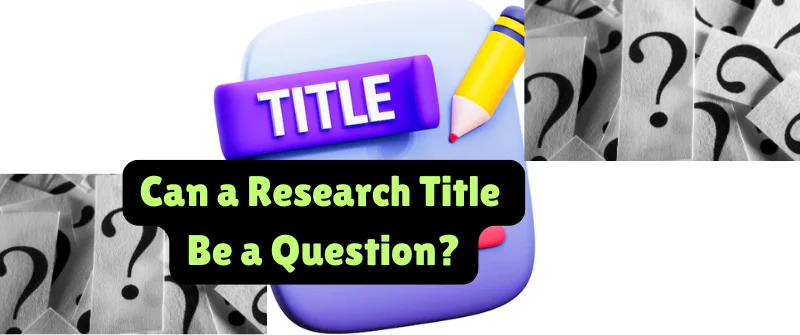Good research must have a title to help the readers or target audience know what they will be reading about beforehand.
Research titles can take different forms and a question is certainly one of the acceptable forms. Research titles in the form of questions are commonly utilized in several academic disciplines.
The reason why titles in the form of questions are widely used in research is that they effectively express the purpose and focus of the study in addition to generating curiosity and interest among the target audience.
Furthermore, research titles in the form of questions help guide the research process through the definition of the objectives and scope of the study.
As such, titles in the form of questions should be clear and concise while at the same time accurately representing the contents to be presented in the research.
To fully understand question titles, it is imperative to first explore the differences they have with traditional titles.
Characteristics and Structure of Question Titles
Just as the name suggests, a question title in a research paper denotes a title that has been crafted in the form of a question.
Instead of the title providing an informative or descriptive summary of the topic of research, the question title unambiguously poses the fundamental research question the study aims to explore or answer.
Therefore, a question title brings forth the main problem or inquiry that the study seeks to address. Such a title has the following characteristics;
1. Concise

Effective question titles are brief and straight to the point. They should adequately capture the main purpose of the research question without necessarily utilizing verbosity.
2. Specific and Clear
Question titles should also be clearly stated in such a way that they address the research question. Their specificity should indicate the particular issue or aspect being investigated.
3. Interrogative Form
Effective question titles are crafted to appear as interrogative sentences that directly pose the research question. This differentiates them from informative or descriptive titles.
4. Reflective on the Research Scope
Question titles are also structured in such a way that they align with the objectives and scope of the study. They capture the major inquiry that the study is to explore.
5. Engaging
The structure of question titles should be engaging so that they can pique the audience’s interest.
This means that the titles should stimulate the audience’s curiosity to encourage them to delve into the contents of the research.
6. Avoidance of Yes/No questions
Though they are framed as questions, question titles avoid simple yes and/or no questions. They instead prompt a more nuanced exploration or investigation.
7. Alignment with Research Content
When structuring question titles, you should ensure that they accurately and adequately represent the content of the study. They should align with your research problem, methodology, and findings.
Traditional vs. Question Titles
Question titles and traditional titles have distinct characteristics that make them serve different purposes.
Below are some of the common differences between the two:
Traditional Titles:

1. Descriptive
Traditional titles are meant to give a succinct breakdown of the topic of research. They also highlight the main concepts, variables, or phenomena that are being investigated.
The clarity in titles help to bring out the persuasiveness of any paper.
A good example to demonstrate this is: “The Effects of Regular Exercise on Mental Health: A Meta-Analysis”.
2. Informative
Traditional titles often convey the content and focus of your research by giving the readers a concise idea of what they should expect in the research study.
An example is: “A Comparative Study of Employee Performance in Private and Public Schools”.
3. Objective
Traditional titles provide objective information without implying subjectivity or without posing a question.
Question Titles:
1. Provocative
Question titles engage readers and arouse their curiosity by posing a thought-provoking questions. Such a question stimulates the readers’ interest in the research.
2. Driven by Inquiry
Question titles unambiguously state the question of research to be answered in addition to emphasizing the core inquiry of the study.
A good example of such a question title is: “What Factors Impact Customer Behavior in Online Shopping?”
3. Subjective
Research titles in the form of questions often imply the researcher’s interest or perspective on a given issue. This makes question titles more subjective than traditional titles.
You should note that ultimately, the decision to use question or traditional titles is influenced by the context of research, the desired impact on the target audience, and the disciplinary norms.
If either of the title forms is appropriately crafted, they can effectively convey the focus and purpose of the research. How subjective a title is also helps in delivering the required length of the paper.
Pros and Cons of Question Titles
Advantages

1. Curiosity-inducing and Engaging
Effective question titles are capable of captivating the readers’ attention while generating their curiosity concerning the research.
This results in enhanced engagement and interest in the research study.
2. Clear Research Focus
An effectively formulated question title has the potential to indicate the focus of the research and the particular inquiry the study aims to explore.
Question titles also give a concise summary of the study’s research question and guide the readers on the objectives.
3. Stimulates Critical Thinking
Question titles have the potential to encourage readers to think and reflect on the posed research question critically.
By doing so, question titles promote an in-depth understanding of the research problem in addition to its significance.
Disadvantages
1. Subjectivity
Question titles can easily imply the bias or perspectives of the researcher since they convey the researcher’s viewpoint.
In some research contexts, subjectivity is not encouraged. This is because some contexts require objective and neutral approaches.
2. Lack of Clarity
Though question titles are intriguing, they fail to accurately portray the content of the research. This may at times lead to misinterpretation.
3. Disciplinary Norms
Some academic disciplines expect the traditional presentation of research that also includes traditional titles. Deviating from such norms by creating question titles goes against expectations.
Impact of Question Titles on Readers
1. Enhances Reader Engagement and curiosity

Question titles have a way of enhancing the readers’ engagement and curiosity because of their relevance to the readers’ interests and needs.
Since good and relevant research should be unique, the titles created in the form of questions are also unique and unanswered. This captures the readers’ attention.
2. The Psychological Effect of Question Titles on Readers
Since question titles are unique because they are meant to respond to new research, they arouse the curiosity of the readers. This makes the research relevant to the readers.
Curiosity, concern, excitement in wanting to learn more about the findings, and surprise in understanding the findings are part of an emotional appeal that is due to the readers’ psychological reaction to the question title.
3. How Question Titles Pique Readers’ Curiosity and Encourage them to Delve into the Research
Since question titles align with the interests and needs of the readers because they offer unique and unanswered research questions, they pique the readers’ curiosity.
Because of the answered questions in addition to the concern of understanding the findings, readers are also encouraged to delve into the research.
Examples of Effective Question Research Titles
1. “What Are the Innovative Approaches to Sustainable Agriculture?”
2. “Why is Emotional Intelligence Important for Effective Leadership?”
3. “How Does Exercise Impact Mental Health and Well-being?”
4. “What Are the Psychological Effects of Social Media on Teenagers?”
Tips on How to Use Questions in Research Titles
1. Ensure Clarity and Precision in Question Titles
Effective question titles should be clear and precise to avoid any confusion concerning the major research question and objectives.
The created question title should also be clear. What this means is that it should be straight to the point and unambiguous.
2. Aligning Question Titles with Research Objectives

Question titles should also be aligned with the research objectives and scope of the study. This helps guide the reader on what to expect as they read the study and findings.
3. Align the Question Title with the Research Aims and Hypothesis
The question title should also be aligned with the research aims and hypothesis to ensure that it effectively summarizes the expectations of the study. This acts as a research roadmap to the reader.
4. Have the Question Titles Contribute to Framing the Research Context and Purpose
Effective question titles should contribute to the purpose of the research and context. As noted, question titles should help the reader understand what the study is all about and what the findings might be.
5. Be Creative in Crafting the Question Titles
You should be creative when crafting question titles so that they can be unique and evoke the curiosity of readers.
Conclusion
The reason why titles in the form of questions are widely used in research is that they effectively express the purpose and focus of the study in addition to generating curiosity and interest among the target audience.
Furthermore, research titles in the form of questions help guide the research process through the definition of the objectives and scope of the study.
As such, titles in the form of questions should be clear and concise while at the same time accurately representing the contents to be presented in the research.
The use of question titles, therefore, enhances the readers’ curiosity and engagement so that they can delve into the research.
Though question titles are effective in research papers. You should be careful when crafting them.
Always make sure that they align with the research objectives, purpose, context, and hypothesis in addition to making them clear and accurate.
